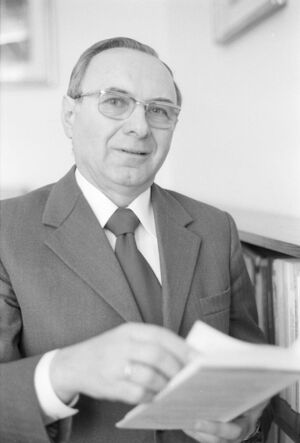Herbert Giersch
(economist) | ||||||||||||||
|---|---|---|---|---|---|---|---|---|---|---|---|---|---|---|
 | ||||||||||||||
| Born | 11 May 1921 Reichenbach im Eulengebirge, Prussia, Germany | |||||||||||||
| Died | 22 July 2010 (Age 89) Saarbrücken, Germany | |||||||||||||
| Nationality | German | |||||||||||||
| Alma mater | University of Kiel, University of Breslau, University of Münster | |||||||||||||
| Member of | Mont Pelerin Society | |||||||||||||
Neoliberal German economist who attended the 1975 Bilderberg meeting. Mont Pèlerin Society.
| ||||||||||||||
Herbert Giersch was a German economist. He was one of the initial members of the German Council of Economic Experts in 1964, sitting on the council until 1970, and also was president of the Kiel Institute for the World Economy 1969–1989. Giersch was considered the most influential German economist during the chancellorships of Willy Brandt, Helmut Schmidt, and Helmut Kohl.[1] He attended the 1975 Bilderberg meeting.
As a public economist and director of the Kiel Institute for the World Economy from 1969 to 1989, Giersch blended German traditions of location theory with liberal globalism to lay the foundation of a neoliberal economic push.[2][3]
Background and education
Born in Reichenbach, Silesia, Giersch attended the University of Breslau and the University of Kiel between 1939 and 1942, until he was drafted to serve in World War II.[4]
Career
Returning from war captivity, he received his Ph.D. in economics from the University of Münster in 1948. From 1948 Giersch was a Fellow at the London School of Economics and Political Science and worked as a lecturer for the Organisation for European Economic Co-operation, OEEC in Paris (1950 to 1951 and 1953 to 1954).
Giersch received a full professorship at the Saarland University in 1955. In 1969, he succeeded Erich Schneider at the Kiel Institute for the World Economy at the University of Kiel, and held that chair until 1989. Giersch strengthened the institute's policy-advising role in Germany by playing a leading intellectual role in the German Council of Economic Experts. He was a visiting professor at Yale University (1962 and 1977 to 1978).
Originally adherent to Keynesian economics in the 1950s and 1960s, he gradually became an advocate of supply-side economics in his later years.
From 1986 to 1988 he was president of the Mont Pèlerin Society.
Event Participated in
| Event | Start | End | Location(s) | Description |
|---|---|---|---|---|
| Bilderberg/1975 | 25 April 1975 | 27 April 1975 | Turkey Golden Dolphin Hotel Cesme | The 24th Bilderberg Meeting, 98 guests |
References
- ↑ https://www.faz.net/s/RubB8DFB31915A443D98590B0D538FC0BEC/Doc~E46257ABE15FB4F71AF6D6F8D24ED4D85~ATpl~Ecommon~Scontent.html
- ↑ https://www.academia.edu/34352876/Landscapes_of_Unrest_Herbert_Giersch_and_the_Origins_of_Neoliberal_Economic_Geography
- ↑ https://www.wiwo.de/politik/deutschland/zum-tode-von-herbert-giersch-deutschland-verliert-einen-seiner-besten-oekonomen/5663994.html
- ↑ https://www.faz.net/aktuell/wirtschaft/wirtschaftswissen/wirtschaftsforscher-herbert-giersch-gestorben-11009445.html